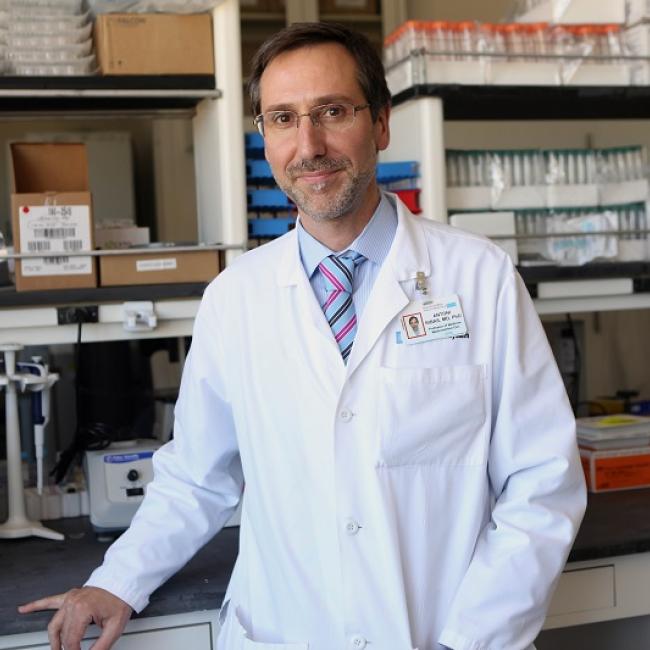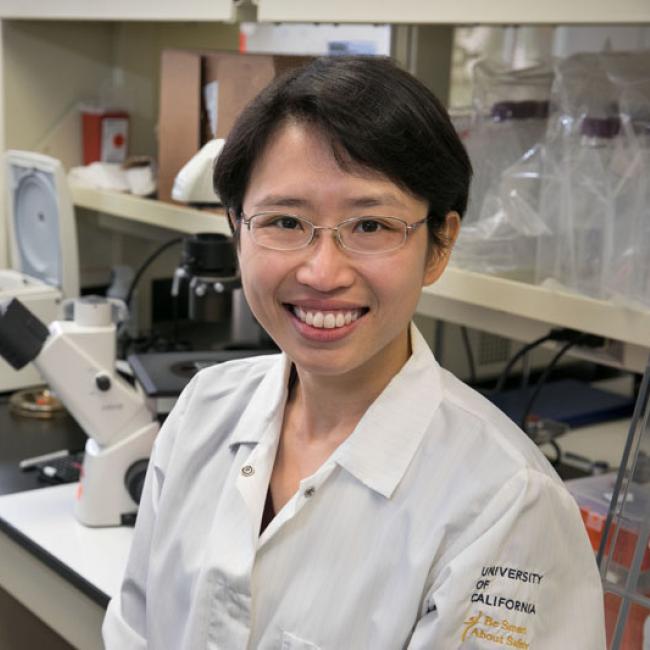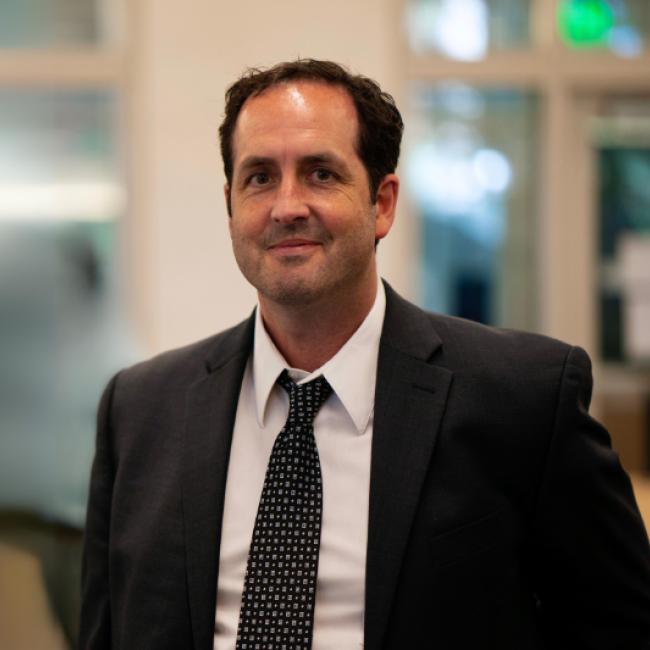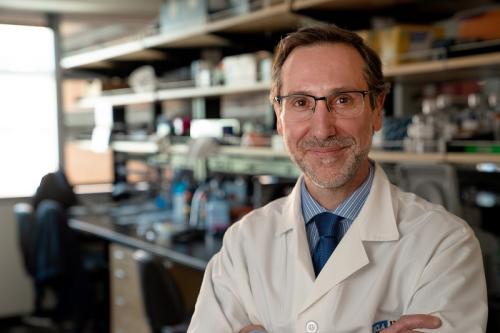
UCLA builds on history of success developing novel immunotherapies to treat cancer
Cell-based therapies and immunotherapies are revolutionizing the fight against cancer and are being used in clinical settings to successfully treat patients with solid tumors as well as blood cancers.
UCLA Health’s cancer researchers are leading that charge — and have been for more than two decades.
Their groundbreaking research ushered the U.S. Food and Drug Administration’s approval of an immune checkpoint inhibitor as a first-line treatment for metastatic melanoma and non-small lung cancer. The drug now is being used globally, alone and in combinations with other drugs, to treat nearly two dozen types of cancer.
UCLA-led research also resulted in FDA approval of the first chimeric antigen receptor (CAR) T-cell therapy to treat resistant blood cancers. UCLA Health is one of the few hospitals in the U.S. to offer all five therapies.
Researchers now are studying a promising combination of regimens developed at UCLA for patients diagnosed with glioblastoma and other aggressive cancers.
“Now we have immunotherapy as a valid option for many patients with cancer,” said Antoni Ribas, MD, PhD, director of the Tumor Immunology Program at UCLA’s Jonsson Comprehensive Cancer Center and a member of the Eli and Edythe Broad Center of Regenerative Medicine and Stem Cell Research at UCLA. “It effectively has given a fourth pillar of cancer therapy besides surgery, radiation therapy and chemical therapy.”
He noted many of today’s treatments stem from seminal discoveries made by researchers at UCLA in the mid-1990s – a time when generally accepted belief was that an immune response couldn’t be induced in cancer.
Early leader
UCLA has long been a leader in bringing groundbreaking immunotherapies to market, such as with the 2014 approval of pembrolizumab (Keytruda) for metastatic melanoma, led and co-developed by Dr. Ribas.
Pembrolizumab works by blocking a protein called PD-1 that sits on the surface of immune cells and keeps them from recognizing and attacking cancer cells. This was the first class of PD-1 antibodies to receive FDA approval for the treatment of any cancer, ushering in a leading-edge approach that has proven to be game-changing in treating many different cancers.
Dr. Ribas’ work with immunotherapy didn’t end there; in 2017, he launched a first-of-its-kind clinical trial involving the use of genetically engineered blood stem cells to produce cancer-fighting T cells (the immune killer cells) to treat metastasized cancers that have a specific tumor marker, NY-ESO-1 — a protein produced by tumor cells such as melanoma and sarcoma. NY-ESO-1 is found in 10% to 20% of cancers.
One of Dr. Ribas’ current focuses is studying molecular imaging techniques, such as PET scans, to understand how novel immunotherapies work on a molecular level.
More breakthroughs
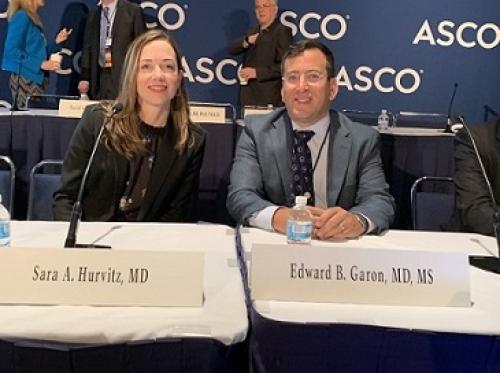
Encouraged by Dr. Ribas’ work, UCLA researchers began to evaluate pembrolizumab to treat other cancers. In 2014, a study was launched on the use of the drug for patients with lung cancer.
Led by Edward Garon, MD, a member of the Jonsson Comprehensive Cancer Center and a professor of hematology and oncology at the David Geffen School of Medicine at UCLA, the ground-breaking research resulted, in 2015, in pembrolizumab receiving accelerated approval by the FDA as a treatment for advanced, non-small cell lung cancer in patients, after prior chemotherapy, who expressed a biomarker known as PD-L1 on at least half of their cancer cells.
Non-small cell lung cancer accounts for about 85% of all lung cancers.
In 2016, the FDA extended the use of pembrolizumab to patients prior to standard chemotherapy.
At the time the initial study of pembrolizumab was launched, the five-year survival rate for all lung cancer patients was approximately 15%, and that figure included patients with early-stage disease, Dr. Garon said. The five-year survival rate for the trial, which enrolled only advanced-stage patients who would not have been eligible for curative therapies such as surgery, was 15%.
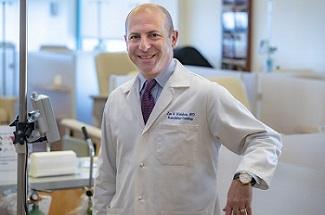
“It’s amazing to see the extent to which this treatment has changed the disease in a rapid period of time,” he said. “Now, nearly all lung cancer patients will receive immunotherapy if they have advanced-stage disease. And there’s data to indicate that in early-stage disease that may also come true.”
UCLA researchers also are evaluating pembrolizumab for use in gastric cancers. Results from a 2020 study led by Zev Wainberg, MD, an assistant professor of medicine and co-director of the GI Oncology Program at UCLA, show that nearly 18% of the 54 patients with a combined positive score (CPS) ≥10 achieved durable responses. Those results suggest that the optimal use for pembrolizumab in gastric cancer is for the treatment of patients with high CPS scores.
Tackling brain cancers
Linda Liau, MD, PhD, MBA, chair of the Department of Neurosurgery at UCLA and director of the UCLA Brain Tumor SPORE (Specialized Program of Research Excellence), is part of a collaboration of researchers studying the effects of immunotherapies on brain tumors.
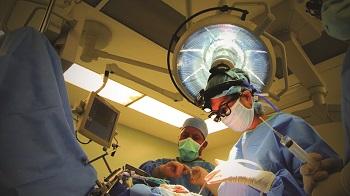
Discovery early in the team’s research found that with the use of certain immunotherapeutic manipulations using cancer vaccines as well as adoptive T cells, they could get activated T cells into tumors in the brain, an organ previously thought to be resistant to immunotherapy, Dr. Liau said. In the late 1990s, UCLA researchers were among the first to use dendritic cell-based anti-tumor vaccines against glioblastoma, one of the deadliest and hardest to treat brain cancers.
Since then, UCLA scientists have developed various iterations of dendritic cell vaccines, genetically engineered T-cell therapies, allogeneic adoptive T-cell therapies and immune checkpoint inhibitors to fight brain tumors. In 2019, UCLA researchers published a study in Nature Medicine suggesting that administering pembrolizumab to patients with recurrent glioblastoma prior to surgery, instead of after, nearly doubled their average life expectancy.
“This data may lead us to a better understanding of the mechanisms by which some patients generate significant immune responses to this therapy while others do not,” study co-leader Robert Prins, PhD, a professor of molecular and medical pharmacology at the David Geffen School of Medicine at UCLA, said at the time.
Dr. Liau, Dr. Prins and their team are studying a new combination protocol, developed at UCLA, that uses checkpoint blockade in conjunction with a personalized dendritic cell vaccine. They hope that combining the two treatments will enable them to create a new way to treat people diagnosed with brain cancer and develop new ways to track the immune response.
Next-gen research
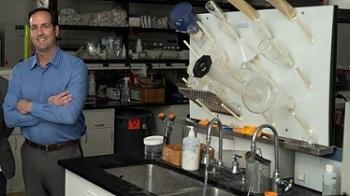
The latest research at UCLA suggests that sequential-combinatorial regimens can make treatment more effective for people with many types of aggressive and resistant cancers.
A preclinical study, led by Roger Lo, MD, PhD, a professor of medicine at the David Geffen School of Medicine at UCLA, from multiple animal models of human melanoma, pancreatic and colorectal cancers driven by common mutations in genes, indicated that administering two doses of an immune checkpoint inhibitor targeting PD-l/L1, then adding MAPK-targeted therapy, is effective in prolonging tumor shrinkage, thereby overcoming treatment resistance.
Based on the findings, a clinical trial to study the combination treatment of binimetinib and nivolumab for advanced V600BRAF wild-type melanoma with innate anti-PD-1 resistance is underway at UCLA.
Dr. Lo, who also is a member of the UCLA Jonsson Comprehensive Cancer Center, views the treatment as a potential game-changer. “If we know how to target these two pathways and combine them, this type of rational regimen could be applied to many other types of cancers,” he said.
He noted that the survival rate of melanoma patients has improved nearly tenfold in the past decade. “We are making inroads because of these types of therapies. But we’re not finished yet.”
CAR T-cell therapy
One of the more exciting breakthroughs in cancer treatments in the past five years has been in CAR T-cell therapies, which work by training a person’s immune system to fight cancer cells by genetically modifying their T cells to recognize and attack the cancer.
One of the first CAR T-cell therapies, axicabtagene ciloleucel (Yescarta), was approved in October 2017 to treat adults with relapsed or refractory diffuse large B-cell lymphoma. Arie Belldegrun, MD, director of the UCLA Institute of Urologic Oncology, was instrumental in commercially developing Yescarta. As founder and CEO of Kite Pharma, Dr. Belldegrun conducted the trials that led to the drug’s approval. UCLA Health was among the few hospitals to offer this therapy to patients.
Since then, UCLA has participated in clinical trials that have led to approval of additional CAR T-cell therapies, including brexucabtagene autoleucel (Tecartus), a CD19-directed therapy approved in 2020 to treat relapsed or refractory mantle cell lymphoma.
Trial co-investigator John Timmerman, MD, a professor of hematology/oncology in the David Geffen School of Medicine at UCLA, in April 2020 noted that after a year of follow-up, 61% of patients remained in remission.
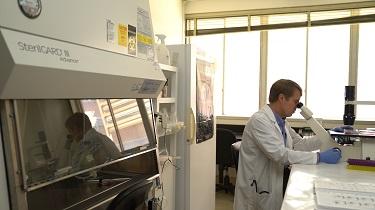
Currently, five CAR T-cell therapies have been approved by the FDA to treat blood cancers — four types of lymphomas as well as multiple myeloma.
“CAR T-cell therapies have caused improvements in survival not seen in other therapies and truly raised the bar in the development of novel therapies,” said Sarah Larson, MD, assistant professor of hematology/oncology at the David Geffen School of Medicine at UCLA and the UCLA Jonsson Comprehensive Cancer Center.
Dr. Larson said while physicians now feel comfortable using the therapies, their goal moving forward is to find ways to improve them.
“The focus is building on what we’ve learned,” she said. “What we’ve done as a division of hematology/oncology at UCLA is bench to bedside and back again. We develop things in the lab, we take them to patients, we learn what works really well and what needs to be improved. Then we take it back to the lab and we do it again.”
New developments
Back in the lab, Yvonne Chen, an associate professor of microbiology, immunology and molecular genetics at UCLA, began to develop a therapy that targets both CD19 and CD20 that are expressed on B-cell lymphoma and leukemia. Rather than modifying all T cells, it modifies a subset of T cells called naïve memory cells.
The thought is that rather than using the conventional single-target approach of CD19 CAR T-cell therapy, a bilateral attack will lead to better tumor control and will increase the life expectancy of patients with these types of cancers.
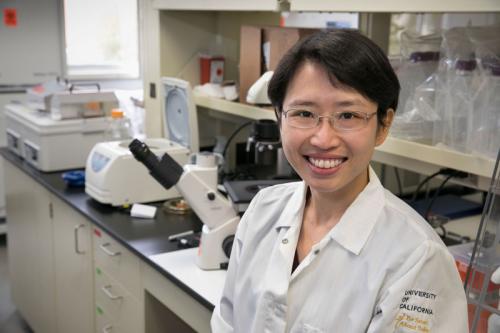
Based on Dr. Chen’s research, UCLA in 2019 launched a pioneering, phase-1 trial, offered exclusively at UCLA, to study the efficacy and safety of CD19/CD20. Thus far, results show a complete response rate of more than 80% among eight patients.
“To have this kind of efficacy has been fantastic, because the primary endpoint is safety,” said Dr. Larson, the trial’s principal investigator, noting the maximum toxicity for cytokine release is grade 1 and there has been none.
Additionally, there has been no ICANS (immune effector cell-associated neurotoxicity syndrome), which compares favorably with commercially available products as well as what they are seeing in clinical trials, she said.
The trial is significant, Dr. Larson noted, because it’s the first time a CAR was fully developed at UCLA and then taken to humans, only at UCLA, without any pharma support.
Collaboration is key
The CD19/CD20 trial is a perfect example of the translational environment at UCLA that makes it a leader in cancer research and care, Dr. Larson said. “I think there’s a real richness there, where there’s a lot of MD and PhD collaboration. That really is part of what makes all this move forward so quickly.”
Dr. Chen currently is developing a dual-input CAR T-cell therapy to treat multiple myeloma, using BCMA and CS1 as the targets. If the Investigational New Drug application is received favorably by the FDA, patients could be enrolled in a clinical trial very soon.
